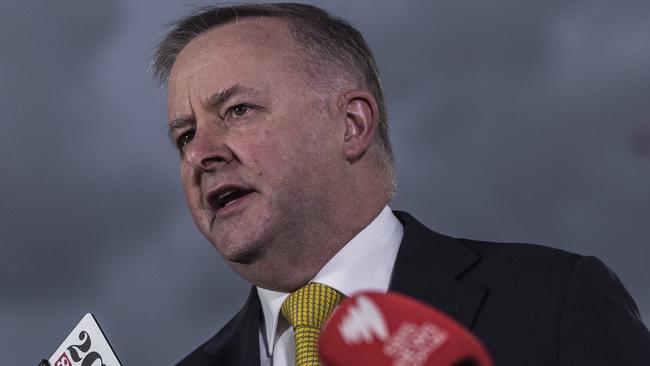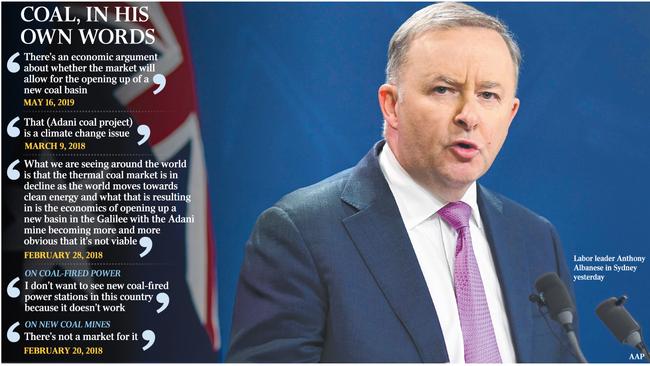Anthony Albanese: Markets will determine Adani coal mine
Anthony Albanese says the markets would ultimately decide the economic case for Adani as he visits Queensland today.

Anthony Albanese has continued to question the economics around the Adani mine, but says a climate change convoy which enraged Queensland communities was “very unproductive.”
The incoming Opposition Leader today fielded multiple questions about his repeated refusal to back the Adani mine,, despite the issue costing Labor votes in north and central Queensland.
Mr Albanese, who is making his first trip to the Sunshine State today, said this morning the markets would ultimately decide the economic case for Adani and pointed to its history of missing deadlines.
“It’s not up to government to determine that, it’s up to markets themselves,” he told ABC radio.
“One of the things that has occurred over a period of time is that the company has not met a range of timelines that they’ve put forward.
“But we will see what decisions the company make once the approvals are made or not made.”
Climate change and the Adani mine has been labelled key reasons behind Bill Shorten’s disastrous performance in Queensland at the federal election, where Labor only managed a primary vote of over 27 per cent.
One of the key issues was a “climate change convoy” of activists led by former Greens leader Bob Brown which travelled through north and central Queensland protesting Adani.
Several Labor MPs have pointed to the convoy as a factor working against them in the campaign and Mr Albanese poured scorn on the activists this morning.
“The truth is that was incredibly provocative and did nothing to advance, in my view, a genuine debate about climate change,” he said.
“To reduce it to a debate about a single mine is very unproductive, it does nothing to advance the debate.
“Good policy is about jobs as well as clean energy, as well as making sure we take the community with us … people could do with less yelling and more genuine debate.”
Mr Albanese will be confirmed as Labor leader by his parliamentary colleagues on Thursday, as he will his presumptive deputy Richard Marles.
Energy Minister Angus Taylor said this morning that Mr Albanese had to be clearer if he supported the coal export industry.
“Is he going to support them? He seems to be pretty unclear on that,” Mr Taylor told Sky News.
“I’m pleased that he is not saying he’s going to get in the way (of Adani) ... we want to see these industries succeed.”
Mine craft doesn’t add up
Yesterday Mr Albanese has questioned the “economics” of opening up the Galilee Basin to coalmining and refused to publicly support Adani’s $2 billion Carmichael mine, ahead of his visit to Queensland today to win back blue-collar workers.
The inner-Sydney left-wing powerbroker, who previously called into question the future of thermal coal and the feasibility of the Adani project, is facing internal pressure to further distance Labor from the coal industry.
Asked yesterday whether he supported the Adani coalmine, Mr Albanese, who will today visit the northern Brisbane electorate of Longman which Labor lost to the Coalition, said he would “respect the process” but did not endorse jobs for central Queensland.
“There is the other issue with regard to Adani, and indeed to the whole issue of the Galilee coal basin, the issue of the economics of it, the basic cost-benefit ratios,” Mr Albanese said, after being confirmed as the ALP’s 21st leader.
“One of the things, for example, that was put forward, was that it should receive a subsidised railway line. No, I didn’t support subsidising a railway line for a private-sector operation.”
Labor MPs and candidates in the central and north Queensland seats of Flynn, Capricornia, Dawson and Herbert signed petitions before the election calling for the development of the Galilee, a 247,000sq m thermal coal basin in central Queensland with an estimated 27 billion tonnes of untapped coal.
Six coalmines in the Galilee Basin have been approved by the state government, which could generate 16,000 jobs and nearly double Australia’s thermal coal production. Mr Albanese faces the task of reversing massive swings in Queensland against Labor at the May 18 election and the loss of two seats, including the Townsville seat of Herbert, which relies on mining to generate jobs and business.

The party’s election failure prompted Queensland’s Labor premier Annastacia Palaszczuk to immediately intervene to end the delays to the approval process of the Adani mine project.
But Mr Albanese’s position on the future of thermal coal is well established. He said last year that “there’s no market” for the commodity and declared that the Adani project was a “climate change issue”.
“Either that or it’s nothing; that’s the argument here. We have a comprehensive plan to deal with climate change to transition our economy away from fossil fuels and towards renewables, to reduce emissions,” he said.
Labor’s poor performance in the state has prompted party powerbrokers to hand Queensland Right MPs two spots on the frontbench, likely securing the position of immigration spokesman Shayne Neumann.
The move is expected to force a member of the powerful NSW Right faction off the frontbench to make way for senator Kristina Keneally, with Ed Husic and Jason Clare under pressure to retain their shadow ministerial positions.
The Australian understands former leader Bill Shorten has indicated his preference for taking the health portfolio and has spoken with Mr Albanese about his intention to serve on the opposition frontbench.
Senior Labor sources said incoming deputy leader Richard Marles, who has the power to choose his portfolio, has voiced interest in taking on foreign affairs but is expected to remain in defence after pushback from Penny Wong.
Mr Albanese’s frontbench is expected to include most of the team Mr Shorten took to this month’s federal election.
Mr Marles also refused yesterday to throw his support behind the Adani mine but backtracked on comments he made before the election suggesting it would be a “good thing” if global demand for Australian coal collapsed.
“The comments I made earlier this year were tone-deaf and I regret them and I was apologising for them within a couple of days of making them,” Mr Marles said.
“It failed to acknowledge the significance of every person’s job.”
Resources Minister Matt Canavan lashed Mr Albanese and Mr Marles for refusing to say they supported the Adani coalmine.
“The Labor Party have heard nothing and learned nothing from the election result,” Senator Canavan said. “People voted last week to protect their jobs, protect their futures, but the Labor Party are showing again that they are no longer the party of workers.”
Queensland Resources Council chief executive Ian Macfarlane, a former Coalition resources minister, said Mr Albanese should throw his support behind jobs in central Queensland.
“It doesn’t really matter what Anthony Albanese thinks about viability — that is a decision for the company and its shareholders,” Mr Macfarlane said. “The project will proceed or not on the basis of its commercial viability and that will be assessed by the company and its shareholders.”
Senator Canavan said he used Mr Marles’s comments — when he said the collapse of coal exports would be a “good thing” — against Labor during the campaign.
The coal and Adani issues helped the Liberal National Party win Herbert and retain Dawson, Capricornia and Flynn, with swings to the government.
The result, which included a statewide primary vote of just 27 per cent, stunned senior Labor figures and prompted the Palaszczuk state government to demand a fast-tracking of its Adani approvals process, with a decision on the future of the mine to be made within weeks.
Senator Canavan also accused Labor’s Joel Fitzgibbon — who came close to losing his seat in the NSW Hunter Valley — of talking up coal post-election to secure a frontbench position.
Mr Fitzgibbon, from the NSW Right, threatened to run for the leadership unless he had written confirmation that there would be a regional MP on the opposition frontbench and the party would explicitly support coal exports.
The Hunter MP — who eventually backed Mr Albanese and Mr Marles as leader and deputy — also said Mr Shorten should have said Labor would welcome and support the jobs and investment from the Adani coalmine if it stacked up.
“If our formal policy is to support the coalmining industry and the export of coal, say it,” Mr Fitzgibbon said in the days following the election.
Labor sources confirmed that Mr Fitzgibbon’s threats may have saved him from being overlooked from a position on the opposition frontbench in favour of Senator Keneally.
NSW Right frontbenchers who will remain part of Mr Albanese’s team include communications spokeswoman Michelle Rowland, environment spokesman Tony Burke, and Chris Bowen, who is expected to lose the Treasury portfolio to Queensland MP Jim Chalmers.
In the Galilee, China Stone has suspended its bid for a mining lease on a $6.7bn coalmine.



To join the conversation, please log in. Don't have an account? Register
Join the conversation, you are commenting as Logout